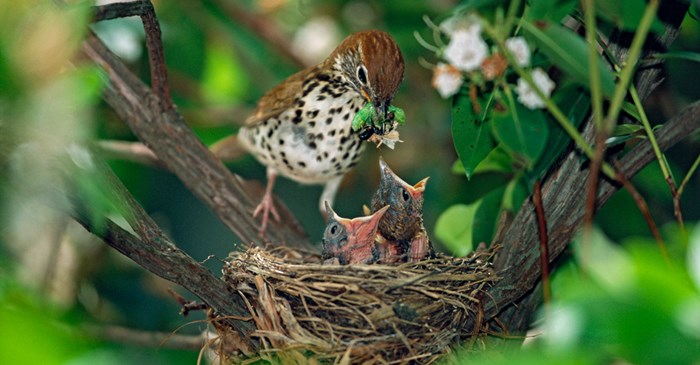If you are delighted in watching the care and nurturing of a nest of baby birds this spring, you can’t help but wonder how life unfolds once they hop out of the crowded nest. When they enter the big wide world, do the young birds continue to recognize their siblings and parents?
The short answer is: It depends.
- Birds that live in social flocks, particularly the Blue Jays and American Crows, recognize their parents, siblings, and offspring their entire lives. They join family flocks, foraging for food together and some even stick around to help their parents raise the next clutch of young.
- Most other songbirds, such as the American Robin, Northern Cardinal, and Black-capped Chickadee, don’t retain memories of their siblings and parents after the first year of life.
This raises other questions about how birds develop and make their way in the world.
What happens when baby birds leave the nest?
Why do birds imprint on their parents?
Even though many birds let go of their family ties, their time in the nest is essential to their development. As you may already know, when baby birds hatch, they imprint on their parents. Imprinting is a type of learning in which an animal develops a sense of identification. This must happen within a specific window of time because imprinting helps the babies learn how to be a bird. Their developing brains are busy learning the nuances of their parents’ songs and calls and behaviors.
How do birds tell each other apart?
When birds are out in the world, they appear to tell each other apart by the unique sounds of their voices — they can detect the differences, even if we humans can’t!
How do birds know where to migrate?
When it’s time to migrate, the young birds make the long journey on their own. Instead of following cues from their parents, they use their instincts to guide the way. However, there have been cases of young birds that got their navigation system scrambled, so instead of flying south, they head north. A few years ago, this Painted Bunting’s unexpected arrival in Brooklyn caused quite a stir!
Keep those feeders filled
These juvenile birds may be little and young, but they are astonishing because they learn so much on their own.
Meanwhile, keep an eye out for fledglings dining at the bird feeder with a parent. The perfect offering for young birds is Lyric Fine Tunes No-Waste Mix with its finely cut blend of seeds and nuts — just right for smaller beaks!
